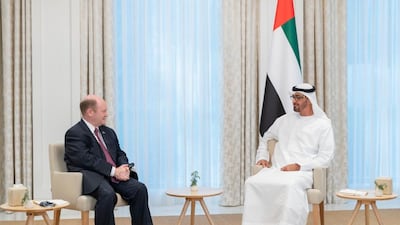Sheikh Mohamed bin Zayed, the Crown Prince of Abu Dhabi, met two US senators in Abu Dhabi on Sunday night to discuss regional security.
Sheikh Mohamed, also Deputy Supreme Commander of the UAE Armed Forces, welcomed Chris Coons and Chris Van Hollen, who both serve on the influential Senate committee on foreign relations.
The three spoke about issues related to regional security, joint action to establish stability and "confronting underlying reasons of tension and conflict in the Middle East and the Horn of Africa regions", state news agency Wam reported.
The UAE and US agreed on "promoting development and prosperity for their peoples".
They also discussed "the prospects of solidifying the strategic alliance between the two nations at the political, economic and defence levels".
In attendance were Sheikh Tahnoon bin Zayed, UAE National Security Adviser, Sheikh Abdullah bin Zayed, Minister of Foreign Affairs and International Co-operation, Sheikh Sultan bin Hamdan, adviser to President Sheikh Khalifa, and Dr Anwar Gargash, diplomatic adviser to Sheikh Khalifa.
Also present were Khaldoon Al Mubarak, chairman of the Abu Dhabi Executive Affairs Authority, and Mohamed Al Mazrouei, Undersecretary of the Crown Prince Court of Abu Dhabi.


